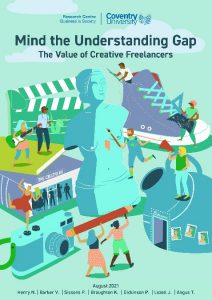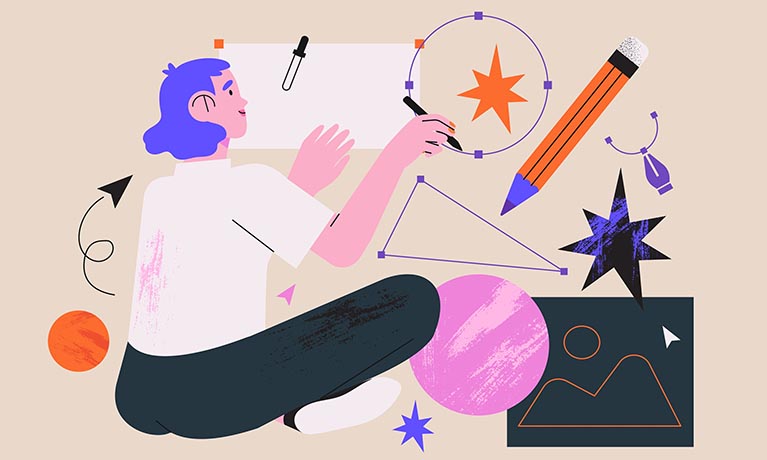By Professor Nick Henry and Dr Kevin Broughton, Centre for Business in Society, Coventry University.
In our recent research on creative freelancers in England[i], reported incomes remained low overall. Around one-third of interviewees reported total earnings of less than £15,000 in the year preceding the pandemic; half had earnings under £20,000. By way of comparison, the Real Living Wage outside London in 2019/2020 was £9.30 an hour, which if working 35 hours a week over 52 weeks would equate to an annual salary of £16,926. Less than a fifth of interviewees earned over £40,000 in the preceding year.
On 12 October 2021, the Irish Government confirmed in its Budget announcement that €25 million had been committed to run a 3 year Basic Income Pilot for Artists and Art Workers, commencing early in 2022. Expected to support around 2,000 individuals, the suggestion is that under the scheme each arts worker would receive an unconditional weekly income in the order of €325 that artists and arts workers could then add to with other taxable income.
The idea of the guarantee of a minimum basic income by the State to (some of) its citizens continues to make headway in the thinking of modern welfare states. For example, Finland is the first nation to have trialled a universal basic income pilot, Germany has a current trial underway, Scotland is consulting on a minimum income guarantee, Wales is seeking to undertake a limited universal basic income pilot and there are increasingly widespread basic income citizen movements across and beyond Europe[ii].
The concept of a basic or minimum income has grown in response to the evidence that wealth inequality, overstretched social security systems and the development of flexible and precarious labour markets is leaving growing numbers of citizens in socially unacceptable levels of poverty and financial insecurity. The Covid-19 pandemic laid bare both various inadequacies of current social protection systems whilst also demonstrating the possibilities of governmental responses to a public health and associated economic shock. Post-pandemic, and in a world where planning for resilience is now valued once more, there are ever louder and more insistent calls for a new social contract between the State and its citizens which delivers an income which ensures an individual’s material existence and participation in society (especially in the face of shocks, whether they be health, environmental, economic, etc.).
The Target of Artists and Arts Workers is No Coincidence
A further takeaway of the Irish announcement is that it is no coincidence that arts and culture – and artists – are the sectoral focus for the Irish government’s proposed basic income pilot. For whilst arts and culture has been one of the hardest hit sectors under the pandemic, issues of low incomes, insecure work and relative exclusion from labour and employment protection both pre-date and beset the sector[iii]. In particular this is because ‘artists and arts workers’ sit at the forefront of what is rather blandly termed ‘atypical work’; that is, employment relationships that do not conform to the standard or ‘typical’ model of full-time, open-ended employment with a single employer over a long time span. Such employment generally entails standard working hours and guarantees of a regular income, and in response states have historically constructed social security systems that are geared towards wage earners, deliver pension payments and provide protection against ill-health and unemployment.
In contrast, cultural and creative workers are more often self-employed, freelancers, work part-time, combine two or more jobs, and do not have a permanent job – notwithstanding being better educated than average. Indeed, self-employment, including freelancing, constitutes a third of the creative industries workforce, more than double the average for the UK (and European) economy (DCMS, 2021). Which means to date that this workforce is often excluded from or only partially covered by social security protection designed for a different labour market age. Furthermore, it is these new forms of employment and work that have been highlighted to display an array of poor working terms and conditions, including their association with the gig economy that, of course, draws its name from the cultural and creative industries.
It is the numerical and structural significance of creative freelancers in the UK’s much lauded creative industries that was the focus of our recently completed research on creative freelancers[iv]. In late 2019, now known as pre-pandemic, we won a research award from the Creative Industries Policy and Evidence Centre and partners to research creative freelancing. Increasingly understood as critical to the sector, we knew also that limited data, understanding and recognition was afforded to this varied ‘under the radar’ community of workers, including concerning issues around income and career insecurity.
Mind the Understanding Gap: the Value of Creative Freelancers

Our recent report Mind the Understanding Gap: the Value of Creative Freelancers, published by Arts Council England National Portfolio and Sector Support Organisation Creative United, is based upon over 100 hours of interviews with 86 self-identified creative freelancers across Coventry, Northumberland and Waltham Forest. In these interviews, the freelancers describe their motivations, how they work, why that way and what it means for their business and personal lives – in short, their lived experiences as creative freelancers.
What we didn’t know as we prepared to start our interviewing in early 2020 was that for too many creative freelancers their work and income was about to fall off a cliff. Their vulnerability within the supply chains and talent pipelines of this world class sector – and the lack of understanding of their business models – was to be made glaringly apparent. Our interviewing was delayed deliberately until mid-2020 and when, notwithstanding the largest economy-wide and sector specific interventions ever seen in most of our lifetimes, large numbers of creative freelancers had fallen regularly through the structural cracks in government support.
Our report sets out how the UK workforce of creative freelancers contributes significantly, and in many ways, to local and national economies, communities, and culture. Their cultural and creative activities deliver self-development and well-being, the joy and buzz of shared cultural participation and citizenship and community outcomes, entrepreneurship and market making. In today’s place-based policy frameworks especially, recognition of this richness of contributions and value, and understanding of how different creative freelancers generate such value, should attract greater levels of investment, funding and support.
The report proposes a typology to better present the range of creative freelancers and the characteristics that define their (business) motivations, and their modes of working. It categorises creative freelancers into creative entrepreneurs, creative contributors, work-life balancers, precarious projecteers, creative ecologists and community creatives.
Recommendations for Policymakers
Using this typology, we make 10 recommendations for national government, creative and cultural sector institutions, and local place-based policy makers. At the national level, we argue that the experience of (creative) freelancers highlights bigger questions on the changing nature of the labour market – and the extent to which existing systems of employment policy, tax and welfare are suited to these shifts, including income and insurance schemes to deal with economic instability. Recommendation 2 suggests the development of income support and employment schemes that recognise and support management of the potentially volatile income flows of precarious and project-based work found within the cultural and creative industries. We suggested international examples and exploratory schemes already exist. Ireland’s entry on to this list can now be confirmed.
One ‘silver lining’ of the pandemic has been the organic and impressive response by the sector to both support and advocate – to ensure creative freelancers are never under-the-radar again. We are pleased that our work has added to this caucus with coverage of the report across sector associations and invitations to present to a variety of sector bodies. The sector response has included also creative freelancers themselves coming to the fore, being enabled and provided with the platform to respond through their own writings, presentations and creative outputs (incidentally, a further recommendation of our report).
Coventry Creates 2021
In this context, our latest output from the Creative Freelancers project is to be launched virtually on Wednesday 8th December 2021. Coventry Creates 2021 is part-funded by Arts Council England in unison with Coventry University and Warwick University and follows the original University Partnership programme of Coventry Creates. During spring 2020, as the Covid-19 pandemic took hold, this place-based University Partnership recognised that the cultural industries faced venue closures, job loss and funding withdrawal. In response to the anticipated damage to the cultural industries, the University Partnership designed and funded a new project to support both local artists and university researchers, whereby researchers were paired up with local artists to produce original artistic and creative outputs from their academic research, whilst developing new collaborative ways of working and instigating longer-term relationships.
Click on the link to register for the launch event of Coventry Creates 2021 and to find out more information on our collaborative artistic endeavour: In Their Own Words: How do we represent Coventry Creative Freelancers’ voices and experiences?. Or you can search the Coventry Creates home page and find the project within all of the 2021 Coventry Creates artistic projects, along with the projects from 2020.
Partners in the Research
Our partners in the research, motivated to close the
understanding gap of creative freelancers, were: Creative United, Coventry City of Culture Trust, London Borough of Waltham Forest, Northumberland County
Council and the Warwick
Institute of Employment Research.
[i] https://www.pec.ac.uk/discussion-papers/creating-value-in-place; https://www.coventry.ac.uk/research/research-directories/current-projects/2020/creative-freelancer-business-models-and-place-based-growth/
[ii] https://www.mckinsey.com/industries/public-and-social-sector/our-insights/an-experiment-to-inform-universal-basic-income; https://www.weforum.org/agenda/2020/08/germany-universal-basic-income-trial-citizens/; https://www.ippr.org/publication/securing-a-living-income-in-scotland; https://research.senedd.wales/research-articles/what-might-a-universal-basic-income-mean-for-wales/; https://www.ubie.org/news/
[iii] Study on the status and working conditions of artists and creative professionals – Final report.pdf (eenca.com)
[iv] https://www.coventry.ac.uk/research/research-directories/current-projects/2020/creative-freelancer-business-models-and-place-based-growth/




Comments are disabled